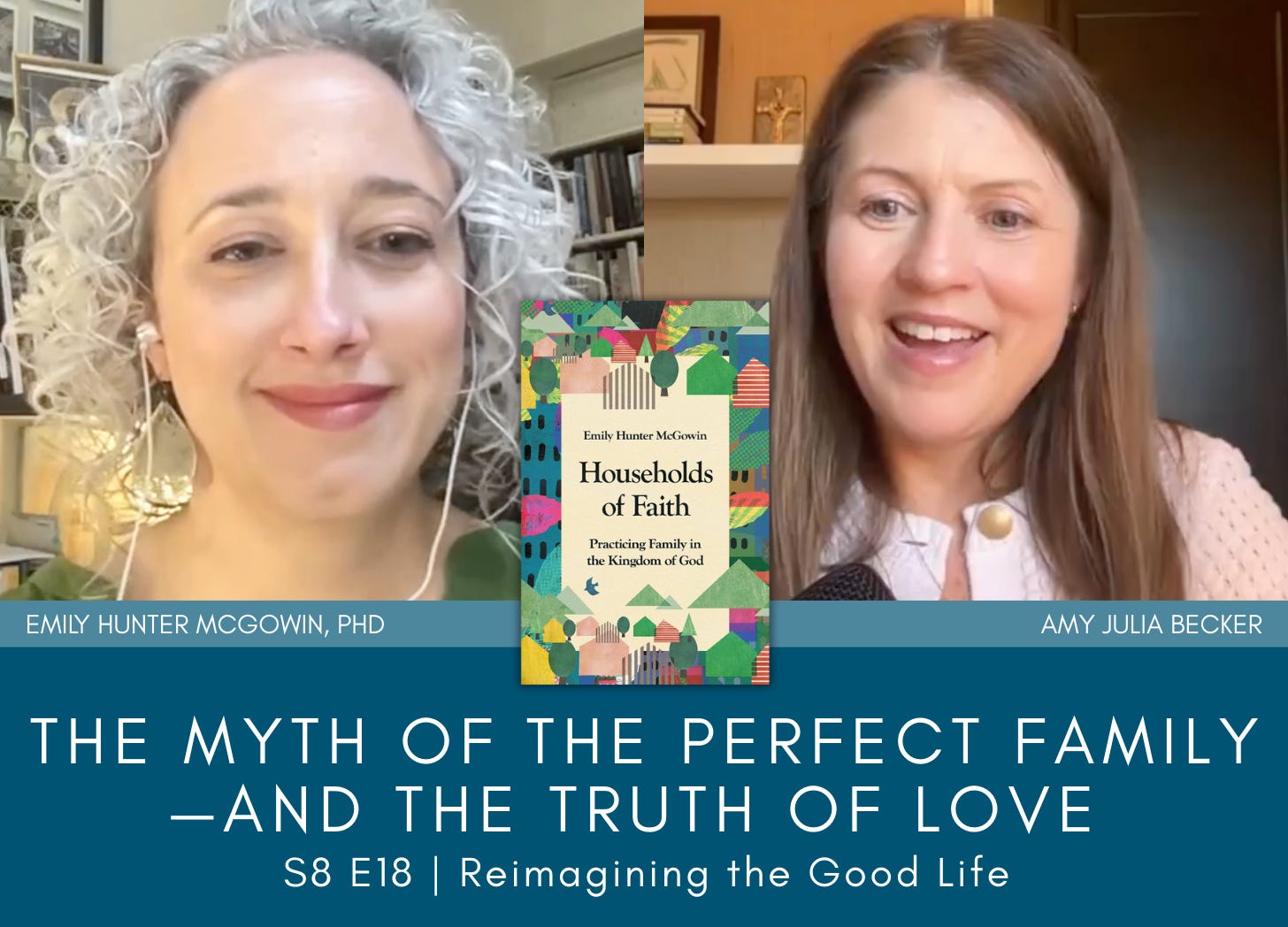If your family is anything like mine, you have some area in your house where holiday cards accumulate until we decide it is time to recycle them, or, as happened this year, our daughter Penny decides to take them all up to her room and look through a few each day for the rest of the year.
We love these little snapshots of families and friends from around the country and around the world, but I’m also always aware that these cards don’t tell even the beginning of the whole story. And I wonder how much those cards, and the images we see daily on Instagram and Facebook, contribute to a misunderstanding of American family life. I wonder how much they create a shiny, happy ideal that doesn’t reflect how most of us actually experience family.
I invited author and theologian Emily Hunter McGowin (PhD, University of Dayton) to join me on the podcast to examine the question:
What if the perfect family doesn’t exist—and what if it never was supposed to?

LISTEN OR WATCH: Apple 🎧 | Spotify 🎧 | YouTube 🎬
We explore:
- the idealized version of the American family
- the misconceptions surrounding a biblical blueprint for family
- creating a home centered on love, not expectations
- apprenticing ourselves to love through daily household practices
Here are a few practical insights that Emily offers households (and it’s helpful to note that households in her definition “are not limited to just the biological nuclear family… [They] can be multigenerational households of married and single, with or without children).”
1. Let go of the “ideal” family myth.
The “ideal” American family is a recent cultural model. It’s not a biblical blueprint for blessing or a promise of happiness.
An invitation: Resist measuring your home against a TV-script ideal. Instead, name and celebrate the actual gifts of your household.
2. Jesus redefines what a full life looks like.
Jesus—unmarried, childless, without property—did not embody the typical vision of “success” in his day (or ours). Emily points out:
“He demonstrates that the fullness of human life doesn’t actually require all of the things that we tend to occupy most of our time, attention, and effort with, especially in the American culture.”
An invitation: Reflect on the ways your household might be called to embody love and hospitality outside conventional milestones.
3. Homes are for love, not status.
Home is not just where we live. It’s where we become “apprentices to love,” compassion, and radical hospitality. Love is formed not in competitions for superiority but in the mundane, like cereal bowls, laundry piles, and sibling squabbles.
An invitation: Shift family goals from perfection and appearance to formation and faithfulness. What practices help your household grow in love?
4. Subversion is part of the household calling.
Families are called not to blend in but to quietly subvert the surrounding culture by living differently—prioritizing love, presence, and community over hurry, consumption, and constant productivity. Subversion doesn’t have to be loud. It can look like lingering around a dinner table, choosing connection over convenience. When our homes become places of peace, they quietly challenge the chaos outside.
An invitation: Set aside a block of time to go screen-free and obligation-free, where your household can intentionally slow down and embody a different set of values. Take a walk, read, nap, or be together without doing or buying. Even a few hours of rest or connection can push back against the dominant narratives.
I hope you’ll listen (or watch), and then share this episode with a friend. And I want to hear from you. Have you ever felt tempted to measure your life against the myth of the perfect American family? What has helped you break free from that myth? Leave a comment! I read every reflection from you. Also, Emily’s book, Households of Faith, is encouraging, thoughtful, and practical. Check it out!
Let’s stay in touch. Subscribe to my newsletter to receive weekly reflections that challenge assumptions about the good life, proclaim the inherent belovedness of every human being, and envision a world of belonging where everyone matters. Follow me on Facebook, Instagram, and YouTube and subscribe to my Reimagining the Good Life podcast for conversations with guests centered around disability, faith, and culture.



